A cure for breast cancer may be in sight! The GRC research team has been studying carbohydrate antigens on the surface of cancer cells and cancer stem cells for years. Lately, a published paper on PNAS reports their new finding of some special carbohydrates.
Treated with a vaccine currently in phase III clinical trial, the new find can efficiently jump-start the immune system and induce abundant IgG antibody to destroy cancer cells. Moreover, the induced antibody specifically recognizes three carbohydrate epitopes, including Globo H, SSEA3 and SSEA4 that only express on breast cancer cells and breast cancer stem cells, yet presents no harm to normal and healthy cells.
 Figure 1: A carbohydrate vaccine capable of targeting three unique glycan epitopes on breast cancer cells and the cancer stem calls.2008, the global cancer cases reached 12.7 million, among which 7.6 million people died from cancer. By 2030, the estimated cancer cases may rise to 21.26 million, and the estimated cancer related death may climb to 12.66 million, indicating an overall increase of cancer burden. Currently, the most occurring cancer is lung cancer, followed by breast cancer, colorectal, stomach, prostate and liver cancer, and pancreatic cancer has the highest death rate. According to Health Department of Taiwan, the number one cause of death in Taiwan has been cancer since 1982. In June 21, 2012, a shocking statistics report published by Bureau of Health Promotion stated that 87,189 people were diagnosed to have cancer in 2009, 7,371 more cases than 2008. On average, there was a new cancer case every 6 minutes and 2 seconds in 2009. That’s 33 seconds faster than in 2008.
Figure 1: A carbohydrate vaccine capable of targeting three unique glycan epitopes on breast cancer cells and the cancer stem calls.2008, the global cancer cases reached 12.7 million, among which 7.6 million people died from cancer. By 2030, the estimated cancer cases may rise to 21.26 million, and the estimated cancer related death may climb to 12.66 million, indicating an overall increase of cancer burden. Currently, the most occurring cancer is lung cancer, followed by breast cancer, colorectal, stomach, prostate and liver cancer, and pancreatic cancer has the highest death rate. According to Health Department of Taiwan, the number one cause of death in Taiwan has been cancer since 1982. In June 21, 2012, a shocking statistics report published by Bureau of Health Promotion stated that 87,189 people were diagnosed to have cancer in 2009, 7,371 more cases than 2008. On average, there was a new cancer case every 6 minutes and 2 seconds in 2009. That’s 33 seconds faster than in 2008.
The three most occurring types of cancer for men are liver cancer, colon cancer, and lung cancer; the three most occurring types of cancer for women are breast cancer, colon cancer, and lung cancer. For every four men, there is one with cancer, and for women, there is one in every five. The high occurring rate generated a great deal of public concern. People are desperate for a miracle drug to cure cancer.
The conventional cancer therapy includes surgery, radiation, chemotherapy, targeted therapy, and antibody therapy. Unfortunately, these treatment regiments are not very effective for late-staged cancer. On the other hand, there has been lack of early diagnosis and no success for the development of cancer vaccine that targets cancer cells, mainly due to lack of unique biomarkers that can be used as targets. Though effective, the cervical cancer vaccine currently on the market targets the virus associated with the cancer but not cancer itself.
Now, a cure for breast cancer may be in sight. The research teams in Genomic Research Center, Academia Sinica have been studying carbohydrate antigens on the surface of cancer cells and cancer stem cells for many years and found some special carbohydrates. Taking account of the vaccine design from the phase III clinical trial on Globo H-KLH breast cancer immunotherapy in Taiwan, the researchers found that when the hexasaccharide Globo H attached to a diphtheria toxin mutant protein CRM197, DT, in combination with an appropriate adjuvant, such as C34, can efficiently jump-start the immune system and induce abundant IgG antibody to destroy cancer cells.
 Figure 2: The expression of Globo H, SSEA3, and SSEA4 in breast cancer cells and breast cancer stem cells.Moreover, the induced antibody specifically recognizes three carbohydrate epitopes, including Globo H, SSEA3 and SSEA4 that only express on breast cancer cells and breast cancer stem cells but not on normal and healthy cells.
Figure 2: The expression of Globo H, SSEA3, and SSEA4 in breast cancer cells and breast cancer stem cells.Moreover, the induced antibody specifically recognizes three carbohydrate epitopes, including Globo H, SSEA3 and SSEA4 that only express on breast cancer cells and breast cancer stem cells but not on normal and healthy cells.
Compared to the conventional breast cancer target therapy, Herceptin, which is effective for 20% of the breast cancer patients, the Globo H-DT vaccine immunotherapy is expected to be effective for more than 90% of the breast cancer patients and can be developed into a cure or preventive vaccine. These results were recently published in PNAS and generated a lot of interests. Dr. Rajendrani Mukhopadhyay, an editorial writer for the American Society for Biochemistry and Molecular Biology (ASBMB), reported this research as a major finding.
Other studies showed that Globo H is found not only on breast cancer, but also on lung, colon, pancreas, endometrium, ovarian, stomach, prostate, and other types of cancer. Therefore, after the vaccine passes the clinical trial and is approved to treat breast cancer, it can be soon apply to treat other eight types of cancer.
Major participants of this study include GRC researchers Chi-Huey Wong, Chung-Yi Wu, and Alice L. Yu, and post-doctoral researcher Dr. Jung-Tung Hung. Students involved are Yen-Lin Huang, Hsin-Yu Lee (Taiwan University Department of Chemistry), and Sarah K. C. Cheung (TIGP Program). This research is funded by Academia Sinica and National Science Council of Taiwan.
The article titled “Carbohydrate-based vaccines with a glycolipid adjuvant for breast cancer,” can be found at the following PNAS website: http://www.pnas.org/content/early/2013/01/24/1222649110.full.pdf+html


